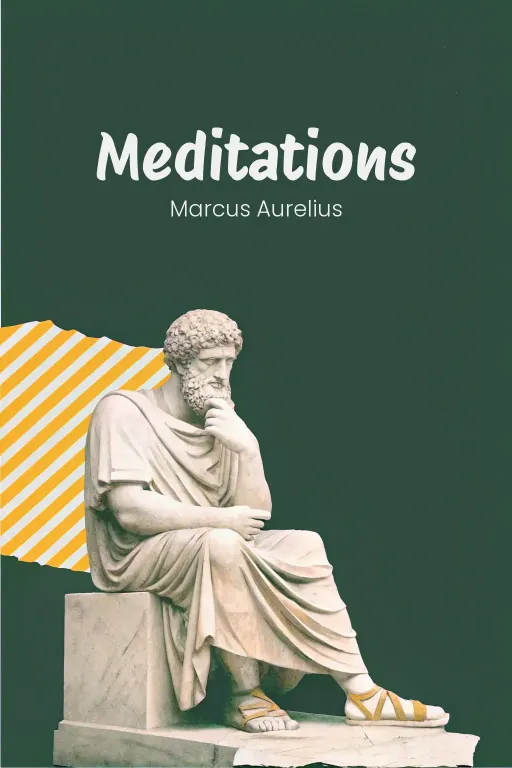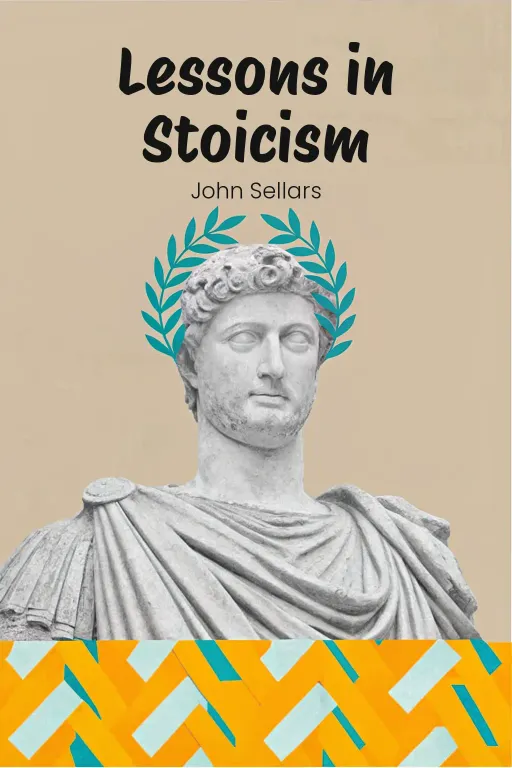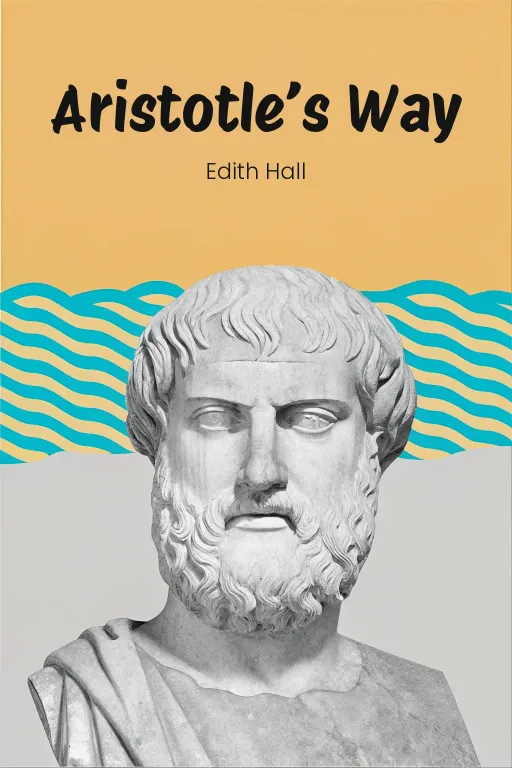
Find Real Joy: Aristotle's Guide to Flourishing
Podcast by Beta You with Alex and Michelle
How Ancient Wisdom Can Change Your Life
Introduction
Part 1
Alex: Hey everyone, welcome back! So, let me ask you something to kick things off: what does happiness really mean to you? Is it those quick hits of joy, like, you know, an amazing vacation or a killer meal? Or is it something… more? Something deeper, that sticks around—like a sense of purpose, a kind of inner peace? Michelle: Whoa, Alex, big question! I mean, when I think “happiness,” my brain immediately goes to scrolling through memes or getting lost in a new TV series. Okay, so what's the deal? Are we about to find out Aristotle had it figured out all along? Alex: Exactly, Michelle! We're actually diving into a book that digs into Aristotle's ideas. Now, wait, hear me out! It might be ancient Greece, but it's all about this concept he called eudaimonia. It’s not just about chasing those fleeting moments, but building a life that has real meaning and purpose. Michelle: So, less about the “treat yourself” mentality and more like… an ancient self-help book disguised as philosophy? I'm intrigued. Alex: Kind of! This book takes a fresh look at Aristotle and connects his ideas to our lives today. It's not just sitting around thinking about stuff; it's full of practical advice. Like, how to deal with our own issues, make good choices, and even how to be a good member of society. Michelle: Okay, you’ve got my attention. What exactly are we going to be digging into today? Alex: Well, we're going to focus on three big ideas. First, we'll look at Aristotle's view on virtues – how developing them can actually help us achieve eudaimonia, or that true sense of well-being he talked about. Then, we'll explore the journey of self-discovery – how understanding ourselves better leads to genuine personal growth. And finally, we’ll talk about why Aristotle believed community was so important for happiness, and how helping others actually helps us too. Michelle: Virtues, self-discovery, and community? Sounds like a recipe for happiness... or maybe just a seriously ambitious to-do list. Alright, let's see if Aristotle's wisdom can actually hold up in the 21st century.
Eudaimonia and Virtue Ethics
Part 2
Alex: Okay, let’s dive right in. The very core of Aristotle’s philosophy is “eudaimonia”. Now, Michelle, you might think of happiness as, you know, those fleeting moments—like the joy of that first sip of coffee in the morning, or the relief when your inbox is actually empty. But Aristotle saw it…differently. For him, “eudaimonia” isn’t about those momentary feelings. It's more about a state of flourishing, a long-term sense of fulfillment that comes from living a virtuous and purposeful life. Michelle: Right, so, less about the dopamine rush of the day and more about a holistic, are-you-living-your-best-life vibe check? Sounds…aspirational. But how do we even get there? Is there, like, an instruction manual? Alex: Well, in a way, there is, and it revolves around virtues. Aristotle believed that to achieve “eudaimonia”, we need to cultivate virtues. These qualities of character guide us to make good decisions and to act ethically. The key, though, is finding the "mean," which he lays out in his "doctrine of the mean". It’s all about balance—avoiding extremes of deficiency or excess. Michelle: So, we’re talking Goldilocks here, huh? Finding the "just right" for our actions and our character traits? Give me a concrete example. What does this look like in the real world? Alex: Okay, think about courage. Someone who’s reckless charges headlong into danger without really thinking. Maybe they climb a cliff without even checking their harness, right? On the other hand, someone who lacks courage, a coward, maybe, would never step outside their comfort zone, even when it’s absolutely necessary. Courage, as a virtue, sits smack-dab in the middle. It’s about assessing risks carefully and then acting. Imagine a firefighter, right? You don’t want them taking reckless risks that put their life and others in jeopardy, but you certainly don’t want them frozen by fear during an emergency. Courage calls for reasoned action! Michelle: So, the firefighter doesn’t just randomly decide to run into the flames or stay put; they have to weigh the risks, understand the situation, and then do what their training and logic tell them. Makes perfect sense. But does it apply beyond these dramatic, heroic scenarios? I’m not a firefighter, Alex. What does this mean for, say, a regular office worker? Alex: That's a really good question. Courage might look a little different in an office. It could mean raising a concern in a meeting, even when no one else speaks up, you know, even though you're nervous about it. Or advocating for a team member when you see that they're being treated unfairly. Virtues aren’t fixed, but they adapt to the context. In each case, the key is balancing impulsiveness with caution. Michelle: I see where you're going with this. But let’s not forget the brainpower needed here. Okay? How do I actually know when I'm hitting the mean and not overshooting straight into recklessness? Alex: Ah, that's where Aristotle’s concept of rational agency comes in. It’s this idea that what really makes humans special is our capacity for rational thought—our ability to deliberate and to make decisions based on reason and ethical considerations. For Aristotle, we aren’t just winging it; we have logos, a kind of intellectual compass. Michelle: So, basically, Aristotle’s betting on us being smarter than our impulses, then? No pressure. What does rational agency look like when it’s applied in, say, some really tricky situations, though? Alex: Imagine an entrepreneur deciding whether or not to take ethical shortcuts to cut costs: using exploitative labor practices, for instance. The immediate payoff looks really tempting: lower expenses, bigger profits. But a rational agent considers the long-term consequences, including the harm inflicted on workers and the potential damage to their reputation among consumers. By staying honest and treating employees fairly, the entrepreneur actually aligns with virtues like fairness and integrity. It’s a decision that serves both their personal moral growth and their community trust. Michelle: Alright, I can see how rational agency helps when you're making those tough calls. But let me play devil’s advocate for a moment. How does Aristotle address happiness when life just isn’t fair? Not everyone gets the same starting point or the same opportunities. Can “eudaimonia” really apply here? Alex: That’s where Aristotle’s vision of virtues really shines, I think. He believed that virtues could be cultivated by anyone, regardless of their circumstances. It’s really not about having material wealth or perfect conditions; it’s about the effort and the intention that you bring to your choices. For example, temperance, the virtue of moderation, can be practiced whether you’re managing a very limited budget or planning an extravagant vacation. It’s about self-awareness and making sure you’re seeking balance. Consider someone who treats themselves to a nice meal, but doesn’t let extravagance define them. That moderation actually supports long-term health and satisfaction. Michelle: So, it’s less about where you start, and more about consistently aligning your actions with your values. I get that. But where does Aristotle draw the line between virtuous living and, I don’t know, just running yourself ragged trying to be perfect? Alex: Well, he'd probably remind us that virtues themselves are practical, not theoretical ideals demanding perfection! They’re tools for navigating life! And here's the twist: Aristotle saw virtues not just as personal qualities, but really as social ones. He emphasized that living virtuously contributes to the collective good, not just individual happiness. Michelle: Alright, give me an example. How does someone’s virtue actually ripple out to benefit other people? Alex: Think about a teacher who embodies fairness in the classroom. By ensuring that every student, regardless of their background, gets an opportunity to succeed, they’re really living the virtue of justice. That commitment doesn’t just shape individual students—it can impact society by modeling fairness and fostering trust in the education system. That ripple effect is Aristotle’s idea of virtues serving a broader purpose and connecting personal happiness with collective well-being. Michelle: I’ll admit, viewing virtues as socially impactful does give them more weight. It’s not just "be good for your own sake"; it’s "be good because it creates a better world." That’s… inspiring, but it also sounds exhausting. Does Aristotle give us any shortcuts here, or is it just effort all the way down? Alex: No shortcuts here, Michelle, but what Aristotle offers is timeless wisdom, really: that happiness isn’t handed to us, but it’s built actively, choice by choice, virtue by virtue. Developing virtues requires learning, reflection, and ongoing effort, but, ultimately, it pays off with a much more fulfilling and harmonious life—not just for you, but for those around you, too.
Self-Knowledge and Personal Growth
Part 3
Alex: Okay, so we've talked about the basics of happiness. Now, how do we actually grow as people and become more aware? Aristotle really dives deep here, suggesting that knowing ourselves is where real well-being begins. It's not just some abstract idea—it's actually key to connecting our morals with how we treat others, which helps us grow both personally and as a community. Michelle: So, hang on, you're not just saying self-awareness is about looking in the mirror and thinking, "Wow, I “really” need a coffee"? There's something more to it than that, right? Like, a grand purpose? Alex: Exactly! Aristotle thought of self-awareness as the engine that drives our personal growth. When we truly understand ourselves—our good points, our weaknesses, what gets us going—we can figure out how to live with a sense of direction. Plus, it’s not just about us; our growth affects everyone around us and, in turn, society itself. Michelle: Right, that sounds pretty ambitious. So, how do we actually "know ourselves"? Is it all about sitting quietly and meditating until we have some kind of epiphany? Alex: Well, that can be part of it, but Aristotle really pushed for actively thinking about yourself. Remember the example of the teacher in the text who was always fighting with their students? At first, they blamed the students for acting up, but when they really looked at themselves, they saw that their own impatience and lack of understanding were part of the problem. This realization turned a stressful situation into one of mutual respect and a better learning environment. Michelle: Oh, so the teacher had to admit, "Hey, maybe I'm not perfect either?" That sounds… tough. But also important, I guess. Alex: Exactly. Thinking about yourself is like holding up a mirror, and what you see isn’t always pretty. Aristotle saw this as essential for finding out the truth about who we are and what we do. And the payoff is huge: when we face those hard truths, like the teacher did, we’re better able to match our actions with qualities like patience and understanding. This not only helps us grow but also strengthens our relationships. Michelle: Okay, I get the self-reflection part. But what do you do when you need to really examine specific actions or choices? It’s one thing to say, "I'm generally impatient," but how do you figure out why you snapped at the barista last week? Alex: That's where Aristotle's idea of self-appraisal comes in. It's like zooming in—taking a close look at your individual decisions and seeing how they line up with your values. He believed this keeps us responsible and helps us adjust when we go off track. Michelle: Alright, can you give me a real-world example? What does self-appraisal actually look like? Alex: Think about the artist in the text. They were chasing after fame and money, producing work they didn’t care about, and ended up feeling really empty. But instead of staying stuck, they stopped to think: Were their actions really in line with their core values of creativity and being true to themselves? The answer was no. That self-appraisal helped them realize they needed to change course, focus on projects that meant something to them, and embrace a more fulfilling path—even if it wasn’t as lucrative at first. Michelle: That's a brave move. I'm guessing Aristotle would call it courageous, right? Alex: Absolutely, but beyond courage, that artist was also being honest—with themselves and their choices. The big takeaway here is that self-appraisal isn’t just a one-time thing. It’s an ongoing practice that helps us stay true to ourselves. Michelle: Alright, but let me challenge this a bit. Doesn’t all this self-reflection and appraisal get exhausting? How do we keep from overthinking everything? Alex: Great point. Aristotle actually addresses that with what he calls the "doctrine of the mean." Basically, it's about balance—not getting lost in overthinking, but also not just coasting by without enough self-awareness. It all comes back to virtues: practicing them in moderation and using reason to guide us. Michelle: Reason again—Aristotle really trusts us to make good choices. But how do we actually match virtues with actions in, say, complicated situations? Life isn't always simple. Alex: Exactly, and Aristotle’s genius is in how flexible his approach is. The example in the text is about a business leader during a recession. They had to balance making tough financial decisions with being compassionate toward their employees. By using both courage and empathy, they not only saved the company but also supported their people. That’s virtue in action. Michelle: I like that—it’s not about following strict rules but thinking things through and making thoughtful decisions. And hey, virtues sound great, but let’s talk about resilience. Because honestly, life doesn’t care about your virtues when it throws you a curveball. Alex: True, but Aristotle believed virtues are what make us resilient. They’re not just ideals; they’re strengths we use to adapt and get through hard times. Take the athlete recovering from an injury that could end their career. They didn’t just work hard physically; they also used virtues like patience, realism, and perseverance to get through it. That resilience wasn’t just luck—it was an active, deliberate practice. Michelle: Okay, so resilience isn’t just about toughing it out; it’s about actively facing challenges and using virtues to guide you? I can see that. Alex: Exactly. And resilience isn’t something you do alone. For Aristotle, self-awareness and personal growth spread to our relationships and communities. Think about the neighborhood leader who revitalized a public space. They balanced being assertive with making sure everyone felt included. The park wasn’t just a physical improvement; it became a symbol of everyone working together, showing how personal virtues can benefit the whole community. Michelle: So, Aristotle’s saying: Get your own life in order, and then watch how it helps everyone around you. That’s powerful, but it sounds like a lot of effort. Alex: It is, but it’s effort that matters. Aristotle’s path to self-awareness and personal growth isn’t about being perfect—it’s about having good intentions and taking action, guided by virtues. In the end, it’s a plan for living ethically, staying strong, and getting along with others, both as individuals and as part of something bigger.
Community and Civic Engagement
Part 4
Alex: Building on individual growth, we're now looking at how these virtues and self-awareness play out in relationships and society, right? Aristotle thought thriving wasn't a solo thing. It's something we achieve together, in a community. So, our next topic: civic engagement! It really broadens the scope to include our responsibilities to each other and society, linking our individual lives to the greater good. Michelle: So, Aristotle was big on teamwork, huh? Let me guess, he’d scoff at the “lone wolf” image. Alex: Absolutely! He famously said, “Man is by nature a political animal.” But don't think he meant running for office! He meant humans are fundamentally social. We thrive through relationships, working together, and contributing. For Aristotle, civic engagement isn’t just a nice extra; it's essential for our well-being, both personally and as a society. Michelle: Okay, great. But when you say “civic engagement,” does that mean I need to start protesting outside city hall tomorrow? Is it really that extreme? Alex: It’s way broader than that, Michelle. Civic engagement is really about actively participating in your community and taking responsibility for its well-being. Aristotle argued that contributing to your society is part of what makes life meaningful. It’s not always huge gestures. Even small actions—like helping out at a local event or volunteering—can make a real difference. And these actions are driven by virtues like generosity, justice, and fairness. Michelle: All that sounds good in theory, but can you give me some real-world examples? I need to see how this actually works. Alex: I've got a perfect story. There was a woman named Aminah, who lived in a neighborhood that had seen better days—no parks, no green spaces, and neighbors who barely spoke. Instead of just complaining or moving away, she took action! She got the neighbors together to brainstorm ideas and eventually led the charge to turn an empty, unused lot into a vibrant community park. Michelle: So, she became an urban planner without the degree? I’d say that’s some initiative there. But how does that connect back to Aristotle? Alex: Aminah's success relied on those virtues. She needed patience to work through disagreements, fairness to make sure everyone had a voice, and the determination to navigate all the red tape to get the park approved. And when the park was finally finished, it was more than just green space. It revitalized the whole neighborhood, strengthened community bonds, and built trust. Aristotle would say Aminah showed how personal virtues can ripple outward to create collective well-being. Michelle: Alright, but not everyone can be the next Aminah, you know? What if someone wants to help but feels like their contribution is a drop in the bucket? Alex: I understand that feeling, but Aristotle’s whole point is that every action matters. Even small ones. Take, for example, a volunteer firefighter named Jacob, in a small rural town. During a wildfire, he had to make a difficult choice: should he focus on protecting his own home from the flames, or should he go help evacuate elderly residents from a nearby nursing home? Even though his property was at risk, Jacob chose to go to the nursing home. So, guided by the virtues of justice and generosity, he saved lives and inspired others to value collective safety over their own individual concerns. Michelle: Okay, choosing people over your stuff makes sense, and it’s definitely admirable. But here’s the deal—what if people don’t play fair? Civic engagement sounds great, but what happens when you’re the only one helping, and others are just taking advantage? Alex: That’s a really important point. Aristotle addresses that by emphasizing the need for justice. Justice is a cornerstone virtue that ensures fairness and prevents exploitation. He believed that in a flourishing society, everyone has to do their part. And for those who don’t? Well, their lack of participation weakens not just the community but their own moral development. Civic life is a two-way street. Your contributions strengthen the collective, and that collective, in turn, supports you. Michelle: I mean, that’s a nice ideal, but life’s messy, right? What happens when people are pulling in different directions? How do you keep things from descending into chaos? Alex: That’s where virtues really come into play to guide us. Generosity, for example, strengthens trust. Justice ensures fairness, and wisdom helps us resolve conflicts. Think of a group of university students who launched a campaign to reduce plastic waste on campus. They had to work with dining services, staff, and even peers who were skeptical. It wasn’t easy. They faced pushback about convenience and cost. But by practicing perseverance and rationality, they managed to reduce plastic waste by 40% in just one year. They improved campus sustainability and fostered a stronger sense of community among students and staff. Michelle: I see what you mean now. It’s not about avoiding challenges, it’s about navigating them with the right mindset. And that mindset—guided by these virtues—kind of has a snowball effect, leading to bigger changes, right? Alex: Exactly! And Aristotle goes even further than that. He believed that civic engagement isn’t just about helping others; it’s a direct path to personal fulfillment. When we connect with others, solve problems together, or just contribute to a shared goal, we find purpose and a sense of belonging. That’s part of what he means when he says happiness is tied to meaningful action. Michelle: Hmm, I’ll admit, there’s something inherently satisfying about tackling problems as a group. But do you think Aristotle’s ideas could really handle something massive, you know? Like rebuilding after a natural disaster? Alex: Absolutely! The rebuilding of New Orleans after Hurricane Katrina is a perfect modern example. Grassroots movements were crucial in restoring the city. Think about the Lower Ninth Ward Living Museum—it was created not just to remember the tragedy but to celebrate the resilience of the community. It became a symbol of hope, showing gratitude, generosity, and justice in action. People came together across divides to rebuild their neighborhoods, proving that civic engagement can foster not just recovery but also shared strength. Michelle: So, even when facing total devastation, Aristotle’s virtues can act as guideposts. It’s about rebuilding more than just buildings; it’s about rebuilding bonds and trust within a community. That's honestly pretty powerful. Alex: Exactly, Michelle. For Aristotle, virtues are the key to transforming challenges into opportunities for collective flourishing. Whether it's a small community park or a massive recovery effort, actively participating in civic life connects us, strengthens us, and helps us get closer to true happiness.
Conclusion
Part 5
Alex: Okay, so to bring it all together, we’ve really explored a lot today. Aristotle’s “eudaimonia” isn’t just some quick hit of happiness, right? It’s this ongoing, active journey of really flourishing by developing virtues like courage, balance, and wisdom. We also touched on how knowing yourself and reflecting on your actions are key to growing and making sure your actions match what you believe in. And finally, we got into how Aristotle saw true happiness as not just a personal thing, but something tied to being active in your community, where your good qualities help everyone around you. Michelle: Exactly, and what’s so amazing is how relevant all this still is. Aristotle isn’t just throwing big philosophical ideas, he’s giving us a real-world guide for leading our lives today. These virtues aren’t just some high-minded ideal, they’re tools we can use every day, whether we’re dealing with something personal, making tough choices, or getting involved in our communities. Alex: Precisely! Aristotle makes us think of happiness as something we create through our choices, not just something that happens to us. So, I want everyone to think about this: What’s one small thing you can do today to make sure your actions line up with what you value? Maybe it’s being more patient, acting fairly, or just taking a moment to really think about what matters to you. Because, in the end, every time you move towards being a better person, you’re also moving towards a better life—for yourself and for everyone else. Michelle: And remember, it’s not about being perfect. Just aim for that "sweet spot," that balance, and keep striving. So go out there, think like Aristotle, and start racking up those virtue points. Who knows? You might just unlock that “eudaimonia” achievement Alex keeps talking about. Alex: <Laughs> Well said, Michelle. Thanks everyone for tuning in. Until next time—keep reflecting, keep growing, and, as Aristotle might say, keep flourishing.









